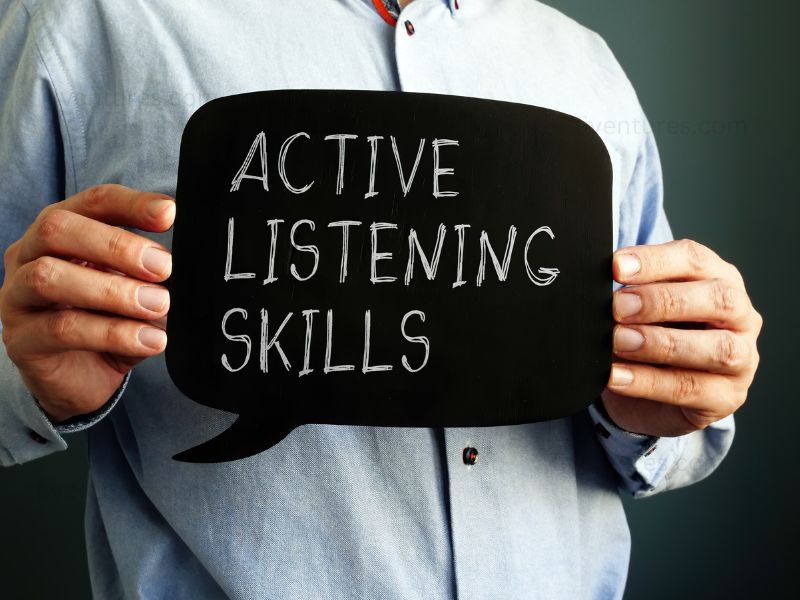The Essence of Active Listening
Active Listening – it’s more than just hearing what someone is saying. It’s a quintessential part of effective communication, a skill that proves invaluable in all walks of life. Picture this: You’re an entrepreneur at a bustling networking event, and you’re engaged in conversation with a potential investor. While they’re speaking, you’re not just hearing their words; you’re observing their facial expressions, noting the inflection in their voice, and reading between the lines of their pitch. This, in essence, is active listening.
Active listening involves comprehending, responding, and remembering what was said. This way, you’re not just involved in the conversation, you’re investing in it. You’re building a stronger connection with the speaker, enhancing mutual understanding, and fostering an environment for productive and meaningful discussions.
Active Listening: The Heart of Effective Communication
If communication is the vehicle driving entrepreneurial success, active listening is the engine. The implications of active listening go far beyond merely avoiding misunderstandings. It plays a critical role in building strong relationships, fostering trust, and gaining insightful information.
Think back to a time when you were having a serious conversation with a friend. You might have noticed how their body language changed depending on how attentively you were listening to them. When you’re fully present in the conversation, nodding in understanding, or responding appropriately, you’re validating their feelings and thoughts. The same applies in a professional setting. Active listening helps others feel valued and heard, creating a favorable impression that can go a long way in the world of entrepreneurship.
Implementing Active Listening in Your Entrepreneurial Journey
Active listening isn’t just beneficial; it’s necessary for an entrepreneur. But how exactly can you implement it in your entrepreneurial journey?
First, you need to resist the urge to interrupt. When you’re in a discussion, it can be tempting to interject with your thoughts or advice. However, true active listening involves letting the other person speak uninterrupted. This allows for a complete understanding of their perspective, a trait that successful entrepreneurs treasure.
Second, make it a habit to give feedback. This doesn’t mean you have to agree with everything the speaker is saying. Instead, provide a brief summary of what you understood from their speech or ask for clarification on certain points. This shows that you’re not just hearing – you’re genuinely interested in understanding their perspective.
The Power of Non-Verbal Cues in Active Listening
Non-verbal cues are the unsung heroes of active listening. Picture this: You’re in a meeting with a team member, discussing new strategies for business development. They’re explaining their idea, but instead of making eye contact, your gaze is locked on your phone. Despite hearing every word they say, the message your body language sends is one of indifference or disinterest.
Non-verbal cues such as maintaining eye contact, adopting an open posture, and nodding in understanding convey your attentiveness more than any words can. They demonstrate respect for the speaker and their ideas. In your entrepreneurial journey, non-verbal cues can significantly enhance your interactions, making your communication more effective and fostering stronger professional relationships.
Active Listening: A Catalyst for Problem-Solving and Innovation
Active listening is not just about interpersonal relationships; it’s a powerful tool for problem-solving and innovation. Entrepreneurs are, by definition, innovators. They thrive on finding unique solutions and driving change. However, the best ideas often stem from a deep understanding of a problem, which can only be achieved through active listening.
For instance, imagine you’re an entrepreneur developing a new product. By actively listening to potential customers during market research, you can identify their pain points and tailor your product to address these problems directly. The value of the insights gained from active listening in such scenarios is immeasurable. By incorporating active listening into your problem-solving process, you can foster innovation and drive your business to new heights.
Active Listening: Navigating Difficult Conversations
Active listening becomes an even more crucial tool during difficult conversations. The stakes are higher in these situations, emotions might be running high, and miscommunication can lead to significant repercussions.
Consider a scenario where you, as an entrepreneur, need to address an issue with a team member’s performance. If you enter the conversation with preconceived notions and don’t listen actively to their side of the story, you risk creating a rift that could harm your team’s overall productivity and morale. But by employing active listening, you ensure they feel heard and understood, and the conversation becomes a platform for constructive feedback and growth rather than a confrontational meeting.
The Relationship Between Active Listening and Leadership
Great leaders aren’t just those who speak well; they’re also those who listen well. Active listening is a vital leadership skill. It creates an atmosphere of respect and openness, allowing ideas and feedback to flow freely within a team.
Take the example of a startup founder. By actively listening to team members, the founder can gain valuable insights that can shape the direction of the company. Furthermore, by demonstrating that they value their team’s input, the founder fosters a culture of mutual respect and cooperation. As a result, team members feel more invested in their work, boosting productivity and commitment to the company’s goals.

Improving Your Active Listening Skills
Now that we’ve delved into the importance of active listening in the entrepreneurial world, you might be wondering how you can hone this skill. After all, like any other skill, active listening requires practice and mindfulness.
One effective strategy is to start by consciously focusing on the speaker. This might sound simple, but in our distraction-filled world, it can be challenging. Try to set aside your thoughts and concerns during the conversation, giving the speaker your undivided attention.
Paraphrasing is another powerful tool. It involves repeating what you’ve heard in your own words. This not only validates the speaker but also ensures you’ve correctly understood their message. Remember, it’s perfectly fine to ask for clarification if you’re unsure – it’s better to ask than to misunderstand.
Overcoming Barriers to Active Listening
Active listening isn’t always easy. Various factors can hinder your ability to listen actively. These can range from external distractions like environmental noise or phone notifications to internal barriers like preconceived notions or emotional biases.
One common barrier is the tendency to start formulating a response while the other person is still speaking. This splits your attention and can lead to you missing key points of the conversation. To overcome this, try to stay in the moment and focus on understanding the speaker before thinking about how to respond.
By recognizing these obstacles and actively working to mitigate them, you can become a better listener, improving not only your communication skills but also your entrepreneurial competencies.
Active Listening: A Lifelong Journey
Active listening isn’t a skill you master overnight; it’s a lifelong journey. It requires constant practice, self-reflection, and a genuine desire to understand others. As you grow as an entrepreneur, your active listening skills will evolve, too. They’ll help you navigate difficult conversations, foster stronger relationships, and make more informed decisions.
Active listening is like a compass in your entrepreneurial journey. It will guide your interactions, steer your decision-making process, and help you navigate the sometimes tumultuous waters of business leadership. Remember, every conversation is an opportunity to practice active listening. So, next time you engage in a conversation, pay a little more attention, show a bit more patience, and listen – not just to respond, but to understand.
Conclusion: Embracing the Art of Active Listening
In the realm of entrepreneurship, effective communication is a critical determinant of success. Active listening, in this context, emerges as a potent tool that can fuel interpersonal relationships, foster innovation, navigate difficult conversations, and guide effective leadership. Embracing this skill can significantly elevate your entrepreneurial journey, bringing you closer to your goals.
However, it’s essential to remember that active listening is not a destination, but a continuous journey. There will be challenges and hurdles along the way. The key is to keep practicing, stay open, and always strive for understanding.
Active listening is indeed an art – a beautiful symphony of understanding, empathy, and mutual respect. It’s the music that can orchestrate your entrepreneurial success.
© 2017-2023,LIVentures LLC.
All rights reserved. No part of this document may be reproduced or transmitted in any form or by any means,
electronic, mechanical, photocopying, recording, or otherwise, without prior written permission of LIVentures LLC.
